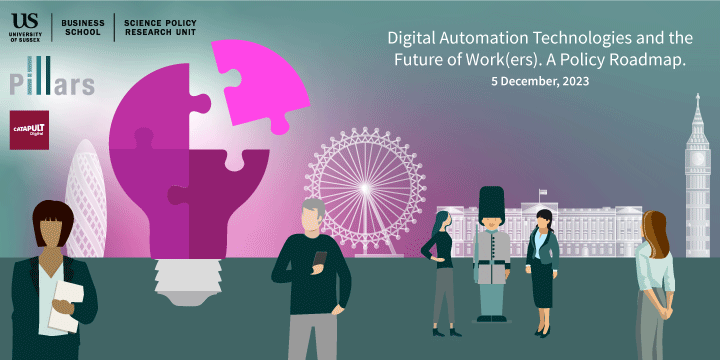Digital Automation Technologies and the Future of Work(ers): A Policy Roadmap
PILLARS Policy Workshop
-
London

In recent years, the accelerating pace of digital automation and its impact on jobs, skills demand and wage inequality has been unprecedented. As the UK aims to strengthen its global position in these technologies, academic research into future trends has become ever more relevant.
From emerging technologies to functional specialisation in skills and Global Value Chains (GVCs), there are a range of rapid technological and socioeconomic shifts with which policymakers are continuing to get to grips. Alongside knowledge of the impact of past waves of Information and Communication Technologies (ICTs), robotisation and Artificial Intelligence (AI) on labour markets and industrial transformation, new research will be invaluable for the critical decisions around investment, education, and skills training to ensure a just and inclusive transition.
This workshop, hosted by the University of Sussex and the Digital Catapult in central London, is a unique opportunity for key stakeholders in Government, NGOs and the private sector to engage the PILLARS Project research team as they pitch the project’s results and discuss their key policy implications.
Agenda
12:00-13:00 – Networking lunch
13:00–13:20 - Introduction to PILLARS
- Summary of the main results with Professor Maria Savona
- Synergies between PILLARS’ results and the mission of Digital Catapult with Brian MacAulay
13:20-13:40 - Industry and occupation exposure to emerging digital automation technologies with Dr Tommaso Ciarli
Tommaso and team will present new dynamic measures of the exposure of industries and occupations to 40 rapidly emerging digital automation technologies. Distinguishing between industries that produce and those that use these technologies, they will show how employment in occupations with different levels of exposure have changed across EU regions. They will also discuss the implications for adoption of these technologies in the UK.
13:40-14:30 - Panel discussion
What does exposure and impact to emerging digital technologies mean for the UK businesses and sectoral structure?
- Dr Robert Smith, Director of Technology AI and Data Science, Digital Catapult
- Grant Fitzner, Chief Economist and Director, Office for National Statistics
- Matthew Houlihan, Senior Director, Government and Corporate Affairs, Cisco
14:30-14:50 - The impact of emerging digital automation technologies on employment and skills in regions. What is next? Quantitative and qualitative evidence with Professor Maria Savona
Maria and team will present the empirical results of the impact of Emerging digital automation technologies on occupations and tasks in regions
14:50-15:10 - Coffee break
15:10-16:00 - Panel discussion
What is the future of work(ers) in the UK labour markets? How to harness AI opportunities and mitigate challenges?
- Nicola Smith, Head of the Rights, International, Social and Economics, Trades Union Congress
- Tera Allas CBE, Director of Research and Economics, McKinsey & Company, PILLARS Advisory Board
- Professor Bart van Ark, Manchester Productivity Institute
- Professor Jacqueline O’Reilly, Co-Director, Digital Centre for the Future of Work (DIGIT), University of Sussex
16:00-16:20 - Digital Skills, all-levels education, apprenticeship schemes and on the job training with Yuchen Guo, Ifo Institute (Leibniz Institute for Economic Research at the University of Munich)
16:20–17:10 Panel Discussion
How to harness education policies and training on-the-job for skills upgrading?
- Debbie Johnson, Skills Foresight, European Centre for the Development of Vocational Training (Cedefop), European Union
- Professor Rebecca Riley Director of Economic Statistics Centre of Excellence, King’s College London
17:10-17:20 - Closing remarks
17:20-18:30 – Networking drinks
For the workshop results have a look at the Policy Brief: Digital Automation Technologies and the Future of Work(ers): A Policy Roadmap